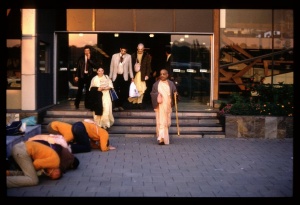CC Antya 17.54

A.C. Bhaktivedanta Swami Prabhupada
TEXT 54
- kṣaṇe mana sthira haya, tabe mane vicāraya,
- balite ha-ila bhāvodgama
- piṅgalāra vacana-smṛti, karāila bhāva-mati,
- tāte kare artha-nirdhāraṇa
SYNONYMS
kṣaṇe — in a moment; mana — the mind; sthira haya — becomes patient; tabe — at that time; mane — within the mind; vicāraya — He considers; balite — to speak; ha-ila — there was; bhāva-udgama — awakening of ecstasy; piṅgalāra — of Piṅgalā; vacana-smṛti — remembering the words; karāila — caused; bhāva-mati — ecstatic mind; tāte — in that; kare — does; artha-nirdhāraṇa — ascertaining the meaning.
TRANSLATION
Suddenly, Śrī Caitanya Mahāprabhu became calm and considered His state of mind. He remembered the words of Piṅgalā, and this aroused an ecstasy that moved Him to speak. Thus He explained the meaning of the verse.
PURPORT
Piṅgalā was a prostitute who said, "To hope against hope produces only misery. Utter hopelessness is the greatest happiness." Remembering this statement, Śrī Caitanya Mahāprabhu became ecstatic. The story of Piṅgalā is found in Śrīmad-Bhāgavatam, Eleventh Canto, Eighth Chapter, verses 22-44, as well as in the Mahābhārata, Śānti-parva, Chapter 174.